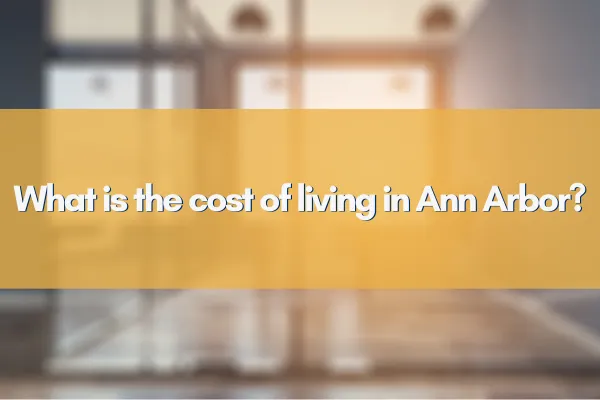
What is the cost of living in Ann Arbor?
What is the Cost of Living in Ann Arbor?
Imagine you’re launching the next big thing, or perhaps just starting a new chapter of life in a vibrant college town buzzing with innovation and culture: Ann Arbor, MI. But before you dive headfirst into this charming city, you need to ask the golden question: What’s the cost of living in Ann Arbor? Spoiler alert: it’s a journey worth understanding—because your wallet definitely speaks louder than your dreams!
Welcome. Let’s unpack the realities of living expenses in Ann Arbor, MI, through the lens of storytelling, real data, and a sprinkle of humor — because who said learning about costs had to be dry?
Living Expenses in Ann Arbor: What You Need to Know
At first glance, Ann Arbor sparkles with a mix of small-town charm and big-city energy. It’s home to the University of Michigan, a thriving entrepreneurial scene, and colorful neighborhoods. But this charm has its price tag.
Housing: The Big Elephant in the Room
Let’s talk real estate—or rather, rental prices. To live comfortably as a single person in Ann Arbor, MI, you should plan for roughly $1,200 to $1,700 per month on rent, depending on the neighborhood and apartment size. Two-bedroom apartments can push this figure upwards, sometimes into the $2,100-$2,500 range.
To give you a clearer picture:
Studio Apartments: Around $1,000–$1,300/month
1-Bedroom Apartments: Typically $1,200–$1,700/month
2-Bedroom Apartments: Approximately $1,800–$2,500/month
Fun fact: Ann Arbor experienced a noticeable rise in housing prices over recent years — a bit like your favorite app suddenly becoming wildly popular overnight.
Why the jump? It’s partly due to growth driven by university demand, tech startups, and limited housing stock. The result? Competition is fierce, meaning renters should be prepared for a bit of a bidding war or compromises on location or amenities.
Utilities: The Unsung Monthly Bills
After rent, utilities silently chip away at your paycheck. On average, residents can expect to pay around $120 to $170 per month covering electricity, heating, cooling, water, and garbage. This figure varies based on apartment size and lifestyle (we're all a little extra during winter… or summer).
Internet: High-speed connections typically cost between $50 to $80 per month.
Tip: Bundle your internet with other services or shop around for special deals. Sometimes, your internet bill can become the sneaky villain in your budget plot.
Groceries & Food: Fueling Your Ann Arbor Lifestyle
Food is where you decide how much you want to spend, but here’s what stats say for a single person:
Groceries: Around $300-$450 per month, depending on your food preferences.
Dining Out: Casual meals cost about $12-$20, while a three-course dinner at a mid-range restaurant might set you back $35-$60.
Ann Arbor knows its food scenes — from pizza joints to vegan cafes. So, budgeting here also means balancing convenience and your love for good eats.
Transportation: Getting Around Ann Arbor, MI
Ann Arbor has a solid public transportation system, but owning a car is common. Here’s a quick snapshot:
Public Transit: A monthly bus pass costs roughly $45-$55.
Gasoline: As of recent averages, expect about $3.50 per gallon, fluctuating like your favorite rollercoaster.
Parking: Note that parking in some neighborhoods or near the university could add extra costs or require permits.
Got a car? Remember to factor in insurance, maintenance, and occasional parking fees.
Healthcare & Miscellaneous Expenses
Healthcare costs vary widely by insurance plans, but budgeting around $200-$400 per month for premiums and out-of-pocket expenses is prudent for many residents.
Additional expenses like gym memberships, entertainment, and personal care can range broadly but typically average near $150 - $300 monthly.
A Day in the Life: Sarah’s Ann Arbor Budget Snapshot
Picture Sarah, a young professional moving to Ann Arbor, MI, from out of state, stepping into her first apartment near downtown:
Rent: $1,550 (1-bedroom)
Utilities & Internet: $160
Groceries: $400
Public Transit & occasional ride-shares: $80
Entertainment & dining out: $250
Miscellaneous (gym, healthcare, supplies): $300
Total: $2,740/month
Sarah’s still able to enjoy concerts, weekend getaways, and gourmet coffee—proving you can have a little fun in Ann Arbor without breaking the bank.
FAQs About Living Expenses in Ann Arbor, MI
1. Is Ann Arbor an expensive city to live in?
Ann Arbor’s cost of living is higher than the US national average mainly due to housing. However, its quality of life and amenities offer value that many find worth the cost.
2. How much should I budget for rent in Ann Arbor?
Expect to spend $1,200 to $1,700 for a one-bedroom apartment. Two-bedrooms average $1,800 and up.
3. Are utilities included in rent prices?
Not usually. Utilities are typically separate and average between $120 and $170 monthly.
4. What other factors affect the cost of living in Ann Arbor?
Transportation costs, health insurance, lifestyle choices like dining out, and entertainment habits can all influence your monthly expenses.
Expert Insights on Ann Arbor’s Cost of Living
Economists note that Ann Arbor represents a microcosm of the “college town premium.” University demand drives housing prices while creating diverse job opportunities in tech and research. According to recent data from Apartments.com and municipal reports, the housing market has tightened, but investment in mixed-use developments is underway, potentially easing pressure on living expenses in the coming years.
Why Understanding Cost of Living Matters
Bringing Steve Jobs’ famous style to this topic: When you know exactly what it takes to live somewhere, you're essentially holding a blueprint—the map to where innovation meets practicality. And in Ann Arbor, MI, understanding your living expenses is like having the right app early: it optimizes your life before the launch.
If you launch your life here without this intel, you might be flying blind. But knowing your costs? That’s the art of flying with purpose.
Ready to Call Ann Arbor Home?
Whether you’re a student, professional, or family, Ann Arbor welcomes dreams with an exciting, yet dynamic, pocketbook reality. The key is to prepare smartly and plan accordingly — and this guide aims to empower you just that.
Questions about finding your ideal place or navigating the Ann Arbor housing market? I’m here to help.
Drop a comment below or contact me directly anytime!
📞 Contact: Daniel DeCapua
📍 Title: Realtor
📲 Phone: 734-730-7061
📧 Email: [email protected]
🌐 Website: spotlighthometeam.com





